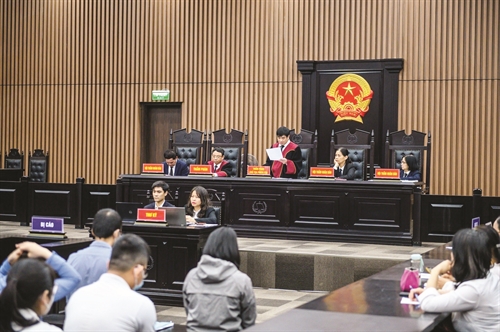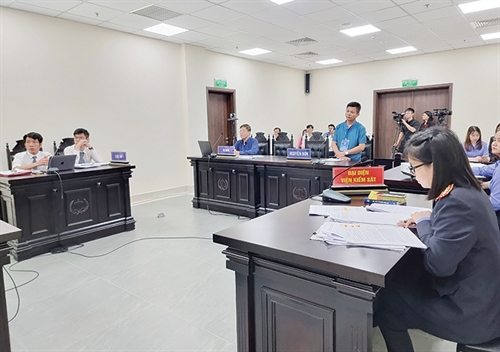Nguyen Van Nam, Ph.D. Deputy Dean of the Law Faculty of the People’s Security Academy
 |
| A court hearing at the People’s Court of Khanh Hoa province on January 23__Photo: Tien Minh/VNA |
In Vietnam’s judicial reform process, precedents have gradually proven to be a source of law complementing legal normative documents. Currently, the principle of ensuring adversarial process is guaranteed on legal grounds in connection to the country’s current judicial reform roadmap. In that context, to create a clearer view of the issue of citing court precedents by lawyers in litigation in the country, the author gives in an insight into legal grounds as well as advantages and disadvantages for such litigate acts of lawyers, and suggests how to increase the citation of case law by lawyers at court hearings, thus contributing to improving the efficiency of litigation activities.
Precedents and legal grounds for referring to precedents in court proceedings
The term “precedent” first appeared in the Party Central Committee’s Poliburo’s Resolution 48-NQ/TW dated May 24, 2005, on the Strategy for building and improvement of Vietnam’s legal system through 2010, with a vision toward 2020 (Resolution 48). Resolution 48 clearly states that one of the solutions for developing Vietnam’s law is “to research the possibility of exploiting and using precedents and customs (including international customary law and commercial practices) and internal rules of professional associations, contributing to supplementing and improving the law.”
Subsequently, the Poliburo’s Resolution 49/NQ-TW dated June 2, 2005, determined that “the Supreme People’s Court has tasks of summarizing trial experience and guiding the uniform application of law, thereby developing precedents and holding court hearings according to cassation or retrial procedures”.
The Resolution of the 13th National Party Congress also reaffirms the promotion of the judicial reform and the role of the Supreme People’s Court in developing precedents and guaranteeing the right to argumentation at court.[1]
Most recently, as defined in the Supreme People’s Court’s Judicial Council’s Resolution 04/2019/NQ-HDTP on the process of selecting, publishing and applying precedents, “Precedents are arguments and rulings in legally effective court judgments and rulings on specific cases that have been selected by the Supreme People’s Court’s Judicial Council and announced by the Supreme People’s Court’s Chief Justice as precedents for courts to study and apply in trial activities”.
Like other countries with (documented) civil law systems, Vietnam has attached great importance to the development of the civil law[2] since the country has embarked on renewing and building a legal system under the socialist market economy mechanism. The application of precedents in civil law is provided in the 2015 Civil Code (Civil Code) as one of its general provisions (Article 6 on application of analogous law)[3].
Similarly, the 2015 Civil Procedure Code (Civil Procedure Code) also specifies cases in which precedents are applied in the trial of civil cases. Specifically, Article 4.2 stipulates: “The court may not refuse to settle a civil case or matter on the grounds of the non-existence of applicable law. A civil case or matter for which applicable law does not exist is the one that falls within the scope of regulation of civil law but at the time it arises and the court is requested to settle it, there is no applicable law.”[4]
Article 45.3 of the Civil Procedure Code, on principles of settlement of a civil case or matter in the absence of applicable law, clearly provides: “Precedents to be studied and applied by the court to the settlement of a civil case or matter are those that have been selected by the Judicial Council and announced by the Chief Justice of the Supreme People’s Court.”
Regarding principles of applying and referring to precedents in court hearings, Article 191.3 of the 2015 Administrative Procedure Law (Administrative Procedure Law) requires: “During the deliberation, the trial panel may base themselves only on documents and evidences already examined and considered at the court hearing, results of the adversarial process at the court hearing, opinions of procurators, and provisions of law, and study and apply relevant administrative court precedents (if any) before deciding on…”[5].
From the above analyses, it can be affirmed that precedents in the Vietnamese legal system in general and those in the civil and administrative laws in particular already have legal grounds for identification and application. Before such legal grounds are provided for the recognition of precedents in Vietnam’s legal system, precedents were merely referred to as a novel element that need to be accepted in Vietnamese legal culture[6].
To date, the term “precedent” has officially become a legal term in the domestic legal system, thereby creating favorable conditions for the development of precedents and referring to precedents by lawyers in litigations in the country. Overall, the principle that the adversarial process is guaranteed in trials is enshrined in Article 103.5 of the 2013 Constitution and affirmed in Article 26 of the Criminal Procedure Code (as revised in 2017), Article 12 of the Civil Procedure Code, and Article 18 of the Administrative Procedure Law.
Referring to precedents is generally understood as the citation of precedents provided in courts’ documents or other legal documents in proceeding arguments. In other words, precedents are treated as a source of case law with mandatory or referential value in order to enhance the persuasiveness of proceeding arguments. In adversarial activities of lawyers during court proceedings, referring to precedents is in essence citing a source of case law along with other law-recognized legal sources as legal grounds for reasoning lawyers’ arguments to be more persuasive for resolving specific disputes/disagreements.
Advantages and disadvantages of lawyers’ referring to precedents in litigation
Advantages
Firstly, current precedents as source of law have gradually been affirmed in the domestic legal system. According to statistics from the Supreme People’s Court’s website on precedents, by May 2024, the Supreme People’s Court’s Judicial Council has announced a total of 70 precedents, including 17 criminal precedents, four administrative precedents, 33 civil precedents, five marriage and family precedents, nine commercial business precedents, and two labor precedents[7].
The Supreme People’s Court has so far conducted legal researches and invited experienced judges (including judges and the Supreme People’s Court’s Chief Justice) and law experts to write commentaries on those published precedents. As a result, four volumes of “precedents and commentaries” have been published. This has created favorable conditions for chief justices, judges, lawyers and other judicial title holders to study and cite precedents in legal proceedings, and help agencies, organizations and individuals that are interested in courts’ activities easily access published precedents and teach law and do legal researches involving the application of precedents.
Secondly, in the judicial reform process which is underway, the role of lawyers in litigation has increasingly been upheld and more strictly guaranteed with the judicial agencies’ guiding texts. Specifically, on May 30, 2016, the Supreme People’s Court’s Chief Justice issued Directive 04/2016/TATC-CA on strengthening the development and publication of precedents and application of precedents in trial activities. On July 4 and 11, 2017, the Supreme People’s Court issued Official Dispatch 144/TATC-PC, guiding the implementation of Resolution 03/2017/NQ-HDTP, and Official Dispatch 146/TANDTC-PC on citing and application of precedents in trial activities.
Disadvantages
First, it can be said that the awareness about precedents and methods and steps of applying and citing precedents by a large number of Vietnamese lawyers and judges remains relatively limited. This can be attributed to the fact that legal education and training of law practitioners in the country have not really been linked with the use of precedents as a source of law and legal research into precedents has not yet received due attention.
Second, though the number of published precedents has gradually increased, the domains of civil, administrative, criminal, labor and commercial laws still see numerous inadequacies that need to be complemented by precedents. The existing number of 70 published precedents is far from enough to meet the practical requirements on the court system’s function of guiding the uniform implementation of law in trial activities through the application of precedents in the adversarial process at court hearings.
Third, the multiplication of good examples of Vietnamese lawyers and defense counsels who possess skills of citing precedents in litigation is still limited. Compared with the advanced justice systems around the world, the audio recording of legal proceedings at court hearings for training of intern lawyers’ adversarial argumentation and precedent citation skills has not yet been widely performed in the country (except cases where audio recording is not permitted for national security reasons).
Recommendations on intensified reference to precedents by lawyers in court proceedings
Firstly, it is necessary to improve Vietnamese lawyers’ awareness about precedents and their role in legal proceedings as well as effectiveness of citation of precedents at court hearings in order to ensure justice and fairness.
Secondly, there should be a monitoring mechanism for judges of courts to guarantee lawyers’ right to make arguments in the adversarial process and correctness of contents of precedents cited in court proceedings. From the perspective of legal culture, Vietnam’s legal system has succeeded in absorbing reasonable elements of the doctrine of precedents from the advanced justice systems around the world. However, the positive value of the application of precedents in trial activities associated with lawyers’ right to refer to precedents in court proceedings should be further promoted so that Vietnam’s judicial system can step by step catch up with those advanced justice systems.
Thirdly, judicial reform in the coming time should continue improving the mechanism to guarantee the adversarial process in trials, encouraging lawyers to make reasonable arguments at court hearings without any time restrictions, and guaranteeing their right to refer to and cite precedents in the adversarial process. If lawyers’ arguments citing precedents are convincing, courts should recognize them in judgments as legal grounds for making their rulings.
Finally, the legal education in general and law practitioner training in particular should be radically renovated toward linking training with practice, using precedents and case studies as much as possible, and intensifying the use of modern law training methods based on domestic and foreign precedents and precedents of international dispute-settling institutions (international courts and arbitrations).-
[1] Nguyễn Hoà Bình, Some contents of judicial reform in the coming time, Tạp chí Cộng sản, March 2022 issue, https://www.tapchicongsan.org.vn/media-story/-/asset_publisher/V8hhp4dK31Gf/content/mot-so-noi-dung-cai-cach-tu-phap-trong-thoi-gian-toi.
[2] Since the initiation of the “doi moi” (renewal) process, Vietnam has issued three Civil Codes including: 1995 Civil Code; 2005 Civil Code and the 2015 Civil Code.
[3] Article 6 of the Civil Code:
“1. In case relations arise within the scope of regulation of the civil law in which it is neither agreed upon by the parties nor provided by law, and no customary practices are applied, the provisions of law that regulate similar civil relations shall apply.
2. In case analogous law cannot be applied in accordance with Clause 1 of this Article, the fundamental principles of civil law specified in Article 3 of this Code and court precedents and equity shall apply.”
[4] Articles 264.2, 266.2.b, and 313.4 of the Civil Procedure Code also clearly stipulate that precedents serve as a ground for the court to make first-instance and appellate civil judgments.
[5] Similarly, Articles 194.2.b and 242.4 of the Administrative Procedure Law stipulates:
“The court shall base itself on results of the adversary process and evidences examined at the court hearing to fully and objectively analyze, assess and judge circumstances of the case, legal grounds and court precedents (if any)”;
“The court shall base itself on results of the adversarial process and evidences examined at the court hearing to analyze, assess and reason the appeal, protest, circumstances of the case, settlement and trial by the first-instance court, and legal grounds and court precedents (if any)”.
[6] Nguyen Van Nam, Theory and practice of doctrine of precedent in the UK, USA, France and Germany and recommendations for Vietnam, the People’s Public Security Publishing House, 2012, pp 376-379.
[7] https://anle.toaan.gov.vn/webcenter/portal/anle/anle, accessed on May 13, 2024.









